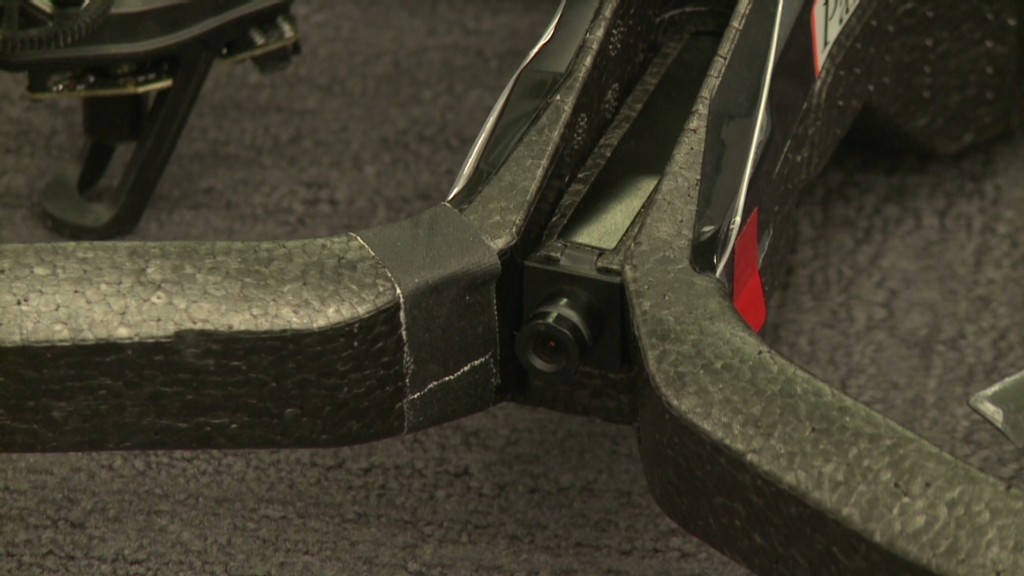
They're coming. And they're not just for the military anymore.
Dozens of companies have sprung up in the last few years making remote controlled, mini-aircraft mounted with cameras, that are increasingly being used for commercial and even entertainment purposes.
But these aren't the remote controlled helicopters you remember flying as a kid. Today's drones are lighter, have better software, longer lasting batteries and vastly improved camera technology.
On the higher end of the cost spectrum are drones with high definition cameras that can operate a mile or more from the person flying it. They can cost tens of thousand of dollars, and are aimed at a variety of commercial uses.
Law enforcement agencies and border patrol are using them to keep tabs on suspected scofflaws. Journalists and sports photographers use them in lieu of expensive helicopters. Real estate agents employ them for aerial photos and video. Wildlife researchers and search-and-rescue outfits are using them or studying the potential. Even the utility industry is interested in having them hunt for downed power lines after a storm.
Related: An exclusive look inside Israel's drones
One of the most promising uses might be in agriculture, said Chris Anderson, former editor of Wired magazine who now runs the drone maker 3D Robotics.
3D Robotics makes a $500 drone that flies itself via GPS, scouring fields for information on crop conditions including water levels, pest infestations and other signs of trouble. Currently, Anderson said farmers pay $1,000 an hour for aircraft flyovers, a cost that's prohibitively expensive.
"Farmers have no idea what's going on in the fields," said Anderson. "It can lead to over irrigation, over pesticide use, all sorts of problems."
There is also a growing market for smaller, simpler drones marketed to kids and adults for recreational use. For example, the Parrot AR Drone, has a range of about 160 feet, is controlled by a smart phone app, and can be bought at Toys R Us for $300. It's aimed at teens and adults that want an enhanced video game experience. Parrot said sales have already exceeded 500,000.
But the spread of the new technology is also raising a host of new issues.
Privacy: While the American Civil Liberties Union is still finalizing its position on drones, the group has some reservations about how the technology could infringe on citizens' rights.
"The technology of surveillance is becoming retail, and that will pose real challenges to our traditional notion of privacy," said Catherine Crump, an ACLU attorney.
With ever-shrinking size and ever better camera technology, the group is concerned that people acting under the assumption that they're in the privacy of their own homes or yards could be wrong.
While stalking laws or other measures would likely prevent someone from hovering a drone outside your bedroom window, "the airspace is something that anyone can fly through," Crump said. "It's not clear that there's anything restricting someone from flying a drone over the property of others."
Related: What it's really like to fly a drone
Regulation: The Federal Aviation Administration was instructed by Congress in 2012 to open up the nation's airspace to routine commercial drone use and is in charge of issuing permits for drones that operate at 400 feet or higher. Since 2009, the number of permits has more than doubled, going from 146 to 345 in 2012.
While the agency is still working up the rules, it has issued a fact sheet with current guidelines.
The FAA says drones that operate below 400 feet are subject to the same rules that govern model aircraft. Those essentially say the drones cannot be flown near populated areas, must stay within eyesight of the user, and cannot be used for commercial purposes, at least until the rules are finalized.
With real estate agents and journalists using drones, it appears those rules are being put to the test. An FAA spokesman said the agency "has investigated operations that appear to be commercial in nature."
But industry advocates say it's not just the government that should have access to this technology. Civilian drones represent a chance for citizens to monitor authority, as Occupy Wall Street protesters reportedly did last year with their drone dubbed "The Occucopter."
"Laws to protect privacy would have to be drafted to protect people's right to take photographs," Crump said.

